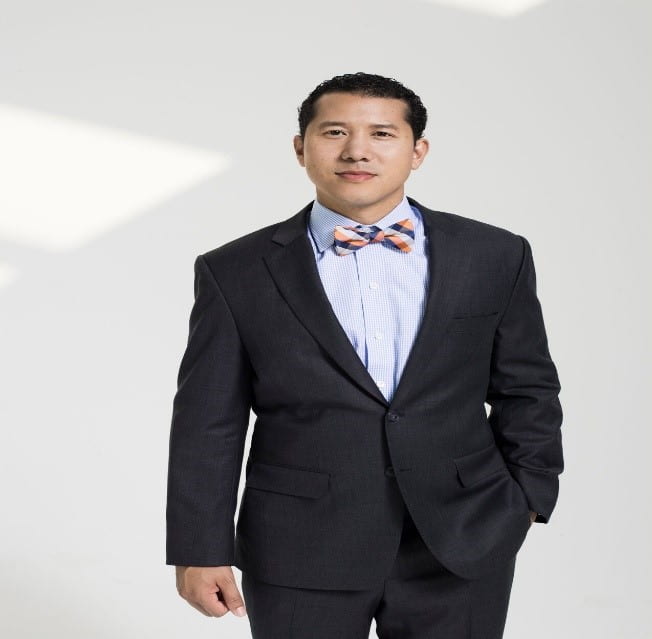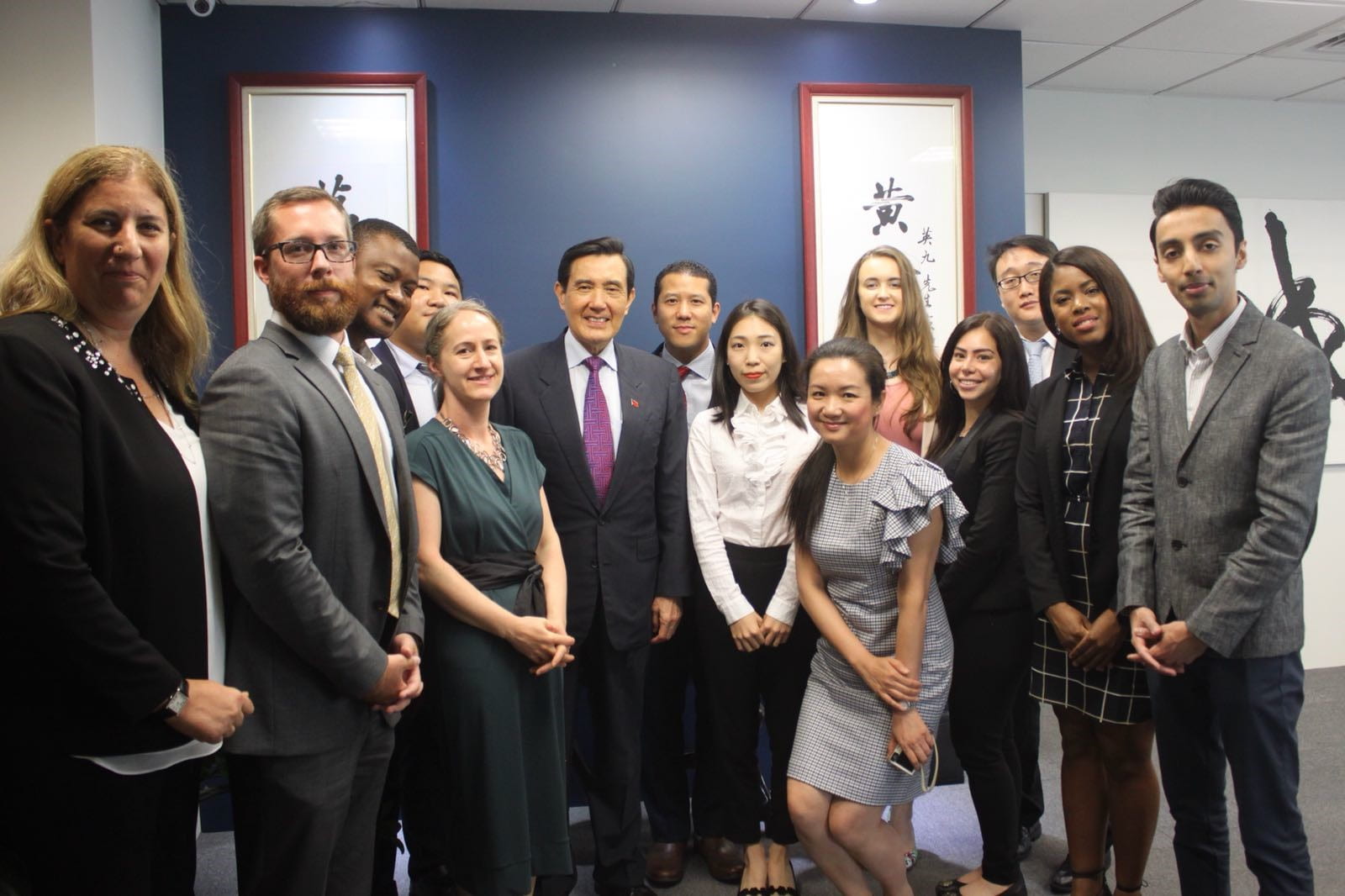By Earl Carr
Founded in 1990, SinoVision is the leading and most dominant Chinese-language TV station in the Metropolitan New York area. It has two Chinese Channels 24-hour digital channel 63.3 and cable channel 73, with an estimated daily viewership of over 800,000. Adjunct professor Earl Carr was interviewed by SinoVision on July 19, 2018. As the interview was conducted in Chinese, Prof. Carr provided a synopsis of the conversation.
 “Earl Carr is a Managing Director at Momentum Advisors based in New York, and an Adjunct Professor at New York University teaching courses on US-Sino Relations and Taiwan & Cross Strait relations. In June of 2018, Professor Carr had the opportunity to be interviewed by Lin Tan, Talk Show Host at SinoVision. In this interview Professor Carr who has held positions at McKinsey & Co, HSBC Bank, Morgan Stanley and now at Momentum Advisors, shares his first foray into Asia studying abroad Beijing as an international student and then later returning back to China to work professionally. He also shares his insights on Sino-US relations along with his unique background and cultural heritage. As a scholar, Earl explores US-China relations particularly within the current geopolitical environment. A common finding is that Americans often lack a deep understanding of China. This prompted his trip earlier this year, where Earl led students to Taiwan to learn more Cross-Strait relations.
“Earl Carr is a Managing Director at Momentum Advisors based in New York, and an Adjunct Professor at New York University teaching courses on US-Sino Relations and Taiwan & Cross Strait relations. In June of 2018, Professor Carr had the opportunity to be interviewed by Lin Tan, Talk Show Host at SinoVision. In this interview Professor Carr who has held positions at McKinsey & Co, HSBC Bank, Morgan Stanley and now at Momentum Advisors, shares his first foray into Asia studying abroad Beijing as an international student and then later returning back to China to work professionally. He also shares his insights on Sino-US relations along with his unique background and cultural heritage. As a scholar, Earl explores US-China relations particularly within the current geopolitical environment. A common finding is that Americans often lack a deep understanding of China. This prompted his trip earlier this year, where Earl led students to Taiwan to learn more Cross-Strait relations.
His journey to learn more about his cultural heritage traces back to his parents. His father was a former Jamaican Ambassador to China, whilst his mother was a Panama born Chinese, but speaks mainly Spanish. Earl was born in Panama but grew up in America. Growing up in the US Earl had limited exposure to Chinese culture growing up.
His interest in Chinese culture peaked when he took up learning Mandarin at The College of William & Mary in part to fulfil his mother’s dream. He would later realize the difficulty of learning a  foreign language particularly in the US and not having the cultural environment which prompted him to participate in a one year study exchange program at Beijing Normal University in China, to better adapt to the language in a Chinese speaking environment. This was also an extraordinary opportunity for Earl to engage in what the Chinese refer to as “寻根”(Xun Gen) searching for one’s roots. Language devoid of culture can be equated to a fish needing water; the very essence and survival is at stake which is why Mr. Carr is so passionate about participating in Global Field Intensive programs at NYU and taking students across the globe to China to experience culture firsthand.
foreign language particularly in the US and not having the cultural environment which prompted him to participate in a one year study exchange program at Beijing Normal University in China, to better adapt to the language in a Chinese speaking environment. This was also an extraordinary opportunity for Earl to engage in what the Chinese refer to as “寻根”(Xun Gen) searching for one’s roots. Language devoid of culture can be equated to a fish needing water; the very essence and survival is at stake which is why Mr. Carr is so passionate about participating in Global Field Intensive programs at NYU and taking students across the globe to China to experience culture firsthand.
Earl shares a personal anecdote about how when he first landed in China, he was approached by a lady commenting on his seemingly Asian features but his very distinct non-Asian hair. Being bi-racial (half Jamaican and half Chinese) Earl found it fascinating how his own cultural identity evolved; as a child being ashamed of his Chinese heritage to then as an adolescent embracing and being proud of his Chinese heritage but more importantly being able to identify with a nation of over 1.4 billion people with social, economic, and political norms so acutely different from he was accustomed to growing up.
These experiences and others, kindled Earl’s interest in learning more about his unique cultural background. Earl shares a time when his father Dr. Earl Carr Sr. then The Jamaican Ambassador to China who accompanied Jamaican Prime Minister P.J. Patterson in 1998 to meet Chinese President Jiang Zemin, Former General Secretary of the Communist Party, which coincided when he was living in Beijing. Earl recalls seeing Jamaican flags along the streets of Tiananmen square and feeling a great sense of pride in his Jamaican heritage which was felt in a more palpable way being so far away from home.
The development of Mr. Carr’s cultural identity continued during his study abroad in Beijing, where a number of other events also occurred. In 1999, during the United States bombing of the Chinese embassy in Belgrade, Earl found himself isolated by some of his Chinese friends whom felt anger and indignation over the recent event. However Earl saw and utilized this as a critical opportunity to serve as a bridge between the US and China serving to promote more common understanding at a grass roots level.
Leveraging his interpersonal skills and international experience Earl brings the same level of passion as a scholar to his role as a financial advisor in global wealth management. Analyzing geo-political and financial markets, Earl gives investment recommendations built on a unique understanding of both countries and the East Asia region as a whole. Looking at the current geo-political landscape Earl sees the looming trade war between the US and China as having severe economic consequences for both China and The US and there being “no winner” in a trade war. In looking at the future of US-China relations, Earl feels that ultimately China and the US need to focus on building a foundation of common interests.”
